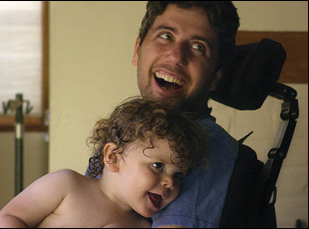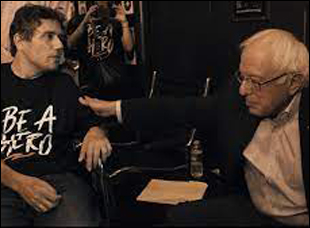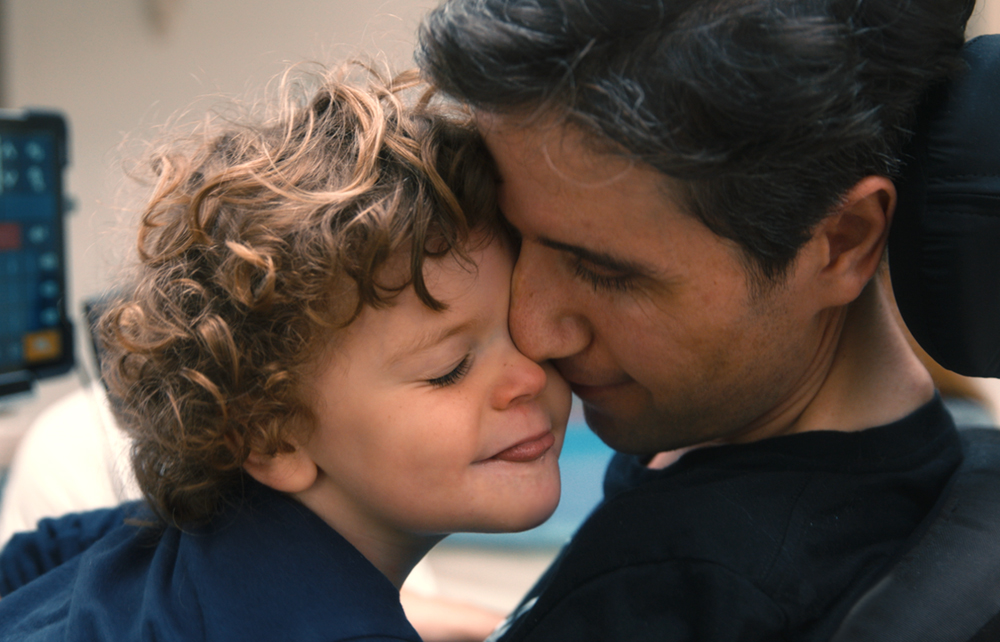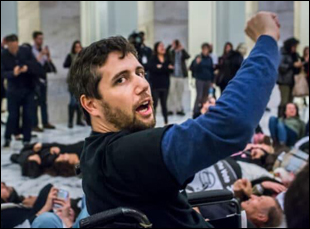When Nicholas Bruckman wants to get to know someone he’s thinking of making a film about, he asks to see their cell phone. In the case of the health care activist Ady Barkan, he got more than he bargained for upon uncovering videos he was making for his newborn son.
“I plugged his phone into my laptop to see every single thing that he had in there and I don’t think [the videos] were on that phone, but he told me about them,” said Bruckman. “I was really grateful that he did that. He’s a storyteller himself. He has this insight about how stories can move people, so it was a very natural fit for him and I think for that reason, he was open to doing this, warts-and-all, documentary of his life.”
Barkan has been an open book for all to see since he rose to prominence on social media, diligently documenting his battle against ALS and his fight for universal health care in the United States. But Bruckman cracks the pages open even wider in “Not Going Quietly,” a galvanizing portrait of the movement Barkan ignited across the country in wake of an encounter with Jeff Flake in 2017 in which he challenged the then-Arizona Senator about his vote that would undo the Affordable Care Act while the two shared a flight. The film reveals that while the confrontation that went instantly viral online wasn’t staged exactly, it was the result of a plan that had come together shortly before as Barkan and fellow activist Liz Jaff saw opportunity only moments after meeting themselves at Dulles International Airport and upon creating a rare moment of human consideration in the political process, the two saw the potential in replicating such events across the country to get their representatives take notice of their constituents.
Although “Not Going Quietly” inevitably finds its focus in Barkan, whose unbridled passion for making sure every American has access to the health care they need is at odds with his own deteriorating condition with a pernicious disease that increasingly takes away his energy and his voice, the film honors his belief in collective power when it celebrates the network of people in his life such as his wife Rachael that offer him support as well as the network of activists he’s building across the country with Jaff with the “Be a Hero” political action committee. With “Not Going Quietly” hitting theaters this week in Los Angeles and New York, Bruckman spoke about how he ended up telling a story about how stories are told, making a movie about a movement as much as a single person and how a film that may have been timed to be released in the thick of the 2020 presidential election if not for the pandemic ended up being more timely in its arrival now.
I met Ady in early 2018, right before he confronted Jeff Flake. I run a production company called People’s TV, and in addition to independent feature films, we also make short-form videos, PSAs, short documentaries — all of it focused around social justice, movement work, democracy building, and political causes that we care about and believe in. So I got a call in early ’18 from Liz Jaff, who if you’ve seen the film, will know is Ady’s partner in crime, who fatefully met him on that plan [to confront Jeff Flake], and she got in touch with me saying she needed a short video for this healthcare organization that she and [Ady], who she just met were founding. It sounded awesome, so I flew up to Santa Barbara to direct this short film and as soon as I met Ady, I completely fell in love with him. I just saw the spark in his eyes of how he was handling this disease.
I don’t think I had the foresight to imagine where it would go, but I did have enough in my conversation with him making the short film, to say, “Hey, Ady, at the end of this interview that we’re doing for this small YouTube ad, could we record a fundraising video for a future documentary that we’ll one day make together?” Part of the reason I had to ask him that is because he was already losing his voice. He’d been diagnosed for about a year at that time, so there was a real urgency to begin the film and to get his buy-in and build that access.
 Something that I enjoyed so much about this is that it shows the importance of crafting a narrative and how much Ady has to sacrifice to get his story out there. Was that always part of this for you?
Something that I enjoyed so much about this is that it shows the importance of crafting a narrative and how much Ady has to sacrifice to get his story out there. Was that always part of this for you?
That’s really the crux of it for me. The movie is hopefully about a lot of things, but what really attracted me to making this film was when Ady told me that they were going to take this on the road. They were going to do this thing that he did to Jeff Flake, which was confronting politicians with personal stories captured on cell phone video and use those videos to shame politicians and win elections. I just fell in love with that idea because as a documentary filmmaker, that’s what we’re trying to do on the meta level. Anybody making social justice films is trying to use narrative as this tool to shape discourse in society and to entertain and move people to action, and he was doing that, armed with Twitter and cell phone videos, and people in wheelchairs, so it was really this storytelling movement. The film, in addition to going behind the scenes about ALS and [Ady’]s doctor’s visits, also tries to examine and unpack how do you build a movement like that? And that’s why we show the machinations, as they’re trying to capture Jeff Flake on film and you see the strategy sessions and how they’re going to achieve this goal because what this film is about is that stories have power.
Was it interesting to balance out a film that at once is a biography but also about the collective? Were those two things at war with each other in the edit?
They were not necessarily a war, but it required an incredibly delicate balance. That was probably the most difficult thing about post-production, was to what extent is this film about Ady and how much is it about this movement? How much is it about his family? What I really wanted to do was embed Ady’s message, which is that the personal is political, so into the actual structure of the film. That’s why the film spends so much time with Ady in his home environment, and examines his feelings about his relationship with his son as a parallel to his relationship with his body, and as a parallel to his relationship with our government, and how he wants to partake in it because those things are directly interwoven.
Anything happen that changed your ideas of what this could be?
Yeah, there was a lot of changes. At one time we thought the 2018 Election might be the climax of the film and it turns out to be the midpoint, so the movie and our production schedule, and our whole trajectory with it, elongated greatly as Ady continued to do incredible work. Then nobody could have expected that as he completely loses his physical voice and body, he becomes more powerful, and influential, and actually affects more change. Certainly when I met him, I never thought that I’d be in the halls of Congress, behind the scenes with him and Kamala Harris and Bernie Sanders — folks that he was really pushing and using his eyes to speak and confront them through this technology. That was a challenge in terms of knowing where to end the story, and we had to really try to avoid chasing the news and the headlines because Ady kept making different types of news, not all of which made the film. But I really wanted to stay grounded in that metaphor I described earlier about his relationship with his family, to his relationship with society and democracy.
 You’ve said elsewhere that because of the changing nature of his voice, you weren’t able to do interviews as you might traditionally when there was no way to cut back in time. How did that influence the making of this?
You’ve said elsewhere that because of the changing nature of his voice, you weren’t able to do interviews as you might traditionally when there was no way to cut back in time. How did that influence the making of this?
There was a couple of really crazy parameters around his voice that I can’t say I’d recommend to other filmmakers to shoot people whose voice changes every day. The first was that it just created this incredible urgency to start the film and capture him saying everything that we could possibly need him to say in his natural voice. But in contrast to that, we had this deep, ethical dilemma where on some days he would run out of words to speak, as you see in the film. He would only have 15 or 30 minutes of words in his vocal chords in a day as ALS took his voice away and as a filmmaker, I wanted to say, “What just happened? Where are we going? How are you feeling?” Which is how, in the field, doc filmmakers work so you feel intimate and close to your subject and connect to them like a friend. But if we did that, that might be time he’d spend talking to me and not to his son on Skype, or not to a crowd, or to his team, so I actually couldn’t talk to him all of the time because it wasn’t really the right thing to do.
That resulted in this creative constraint that ultimately I think helped the film because our only option was to be there at every moment and roll [the camera] a ton, which of course made the editing really arduous. We have hundreds of hours of footage that came down to this 90-minute piece, but sometimes those limitations end up creating a path forward for the story.
It came together so beautifully, and it hasn’t taken the easiest route out into the world when it had been scheduled to premiere last year, but have your ideas around it changed? It’s no less relevant, but the context around it has with a different administration in office.
Yeah, it was supposed to come out in Tribeca 2020, and there was an idea that this is an election year movie, but as I said, sometimes the limitations and the obstacles become your greatest ally. We all saw the writing on the wall that Tribeca wasn’t going to happen, and that allowed us a couple of things — one, we could continue work on the film through 2020 and extend the story to Ady’s work leading into the 2020 election, and second, the film is not about just trying to influence elections. Of course we have one every two years that I hope this film will mobilize people [for], but it’s also about how to hold politicians accountable once they’re elected and that’s the moment that we find ourselves in now.
I think it’s a more hopeful time than it was under the Trump administration, in terms of advancing issues like Medicare for All, but I think the film is actually more relevant now. The struggle for universal healthcare continues and probably won’t be resolved this year, but I hope that the film can really be a tool for people who want to organize and want to tell their stories in a way that you see in the film and hold politicians’ feet to the fire — the ones that we elect — about their promises, and to use our people power to fight the corporate interests and lobbying efforts that we know are on the other side of this healthcare fight.
“Not Going Quietly” opens on August 13th in Los Angeles at the Laemmle Town Center 5 and New York at the Angelika Film Center.





